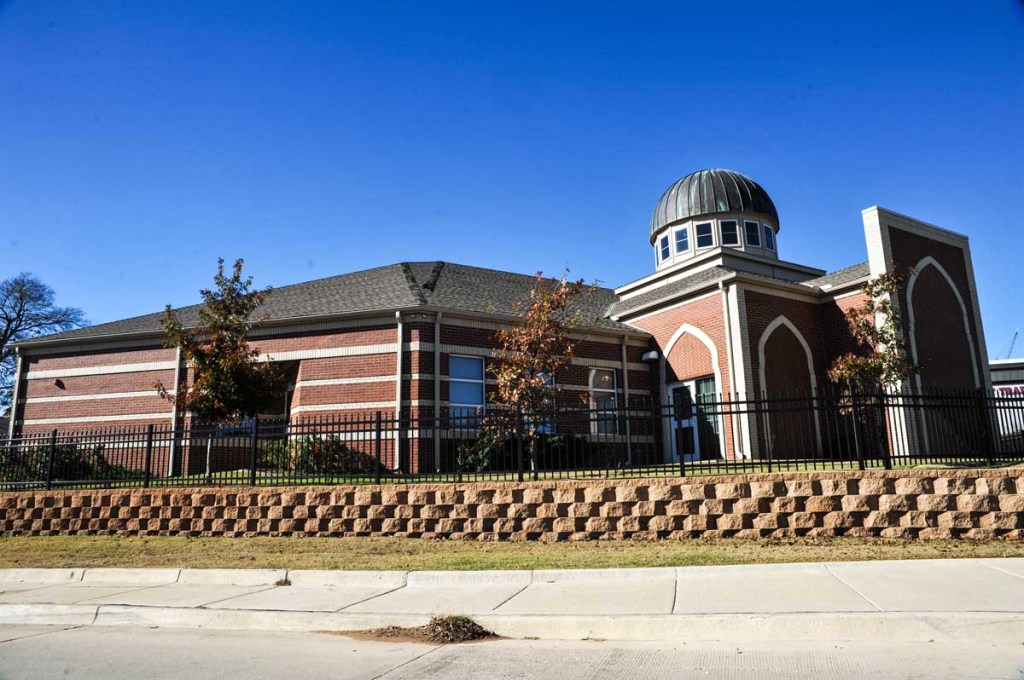Islamic leaders worried about anger directed toward peaceful Muslims
Published 11:30 am Wednesday, November 18, 2015

- The Islamic Society of Norman mosque . (Kyle Phillips / The Transcript)
NORMAN, Okla. — Two days after the terrorist attacks in Paris last week, an Oklahoma man told a 911 dispatcher he felt mentally ill and was planning to shoot anyone who looked Muslim.
After a standoff, deputies from the Norman Police Department, ultimately shot Mark James Riedel after he remained uncooperative, according to the NPD.
While Riedel’s fate is now in the hands of the legal system, the Muslim community in Norman is concerned. With recent terrorist attacks in France and Lebanon perpetrated by extremist Islamic groups, the community is concerned about misdirected anger.
Islamic Society President Ahsan Amil said police were stationed near the Islamic Society of Norman mosque. While Amil said he feels safe in Norman, he said there is a bigger conversation that must be had.
“We are saddened and shocked when we hear this news about atrocities committed anywhere in the world,” Amil said. “These past four weeks have been hard. Muslims stand in solidarity with these victims all over the world. We get a little concerned when people try to use these tragedies to further their political and idealogical aims.”
Amil said the bombings in Lebanon, Turkey, Iraq, the downing of Russian flight A321 and the deadly attacks in Paris have heightened fears surrounding not just Syrian refugees but Muslims everywhere. While he said he was saddened by extremists’ acts, he said extremism has no place in Islam or any religion.
“Judaism, Islam, Christianity, none of them are extreme,” he said. “It’s the people that are extreme … religion is not extreme … I wish I knew what could be done to stop this evil. I can only hope and pray that God transforms their hearts … We obviously don’t support these kinds of things. I hope that more sense will prevail and more peace will prevail.”
He said the key to advancing understanding is communication. He said extremists misinterpret the Quran for their own evil ends.
“For example,” Amil said, “there’s a verse in the Quran, in Chapter 5, Verse 32, that says, ‘Whoever kills a person, it’s as if he has killed all of humanity. And whoever saves one person, it’s as if he has saved all of mankind.’ So, in Islam, no such killing is permissible.”
From his perspective, it’s about focusing on what everyone has in common, not what makes people different.
“I have been in the United States for the last 30 years. Most of the Muslims over here in the United States are very educated, moderate people,” Amil said. “We don’t talk too much about the differences, even amongst Muslims. We talk about what we have in common.”
Senior Imam of Oklahoma City Imad Enchass said there is a difference between Islamic communities in the United States and Europe. He said while the majority of Muslims in America are highly educated, integrated members of society, in Europe they are more often refugees, segregated from their adopted countries, living in ghettos and marginalized by society.
Enchass said the kind of integration that has occurred in the U.S. has made all the difference and it would be a mistake to cast aside societal acceptance for divisive thinking. In fact, he said, that’s what the terrorists want.
“I’m hearing that there’s a clash of civilizations — a term I haven’t heard in years. And that’s exactly what ISIL and those terrorist groups want us to think. The simple fact is, when those terrorist attacks were perpetrated in Paris, the whole world was awakened to the brutality of ISIL,” Enchass said. “The day before that, ISIL bombed my high school in Lebanon. Forty-seven people died in a dual suicide-bombing in Beirut right after that. Before that, there was Turkey. Before that, it was Iraq. Before that, they were all over Syria …”
Enchass said the pattern of terrorism and retaliation has become more routine and more dangerous.
“Are we going to be the kind of people that play into the terrorists’ hands knowing that we are a nation of immigrants?” Enchass said. “The most dangerous pattern that we have seen over the years is politicians speaking ill of Islam, using our tax money and government buildings to speak ill of Islam.
“Our own representative, John Bennett, right here from Sallisaw, wrote that Islam is a cancer that needs to be cut off from our society. People like (Donald) Trump have said they will close mosques down … Those bigoted, xenophobic statements resonate with some people, and they’re dangerous.”
Enchass and Amil believe education, dialogue and interfaith prayer are the way to bridge the gap. Where people fear what they don’t understand, they are hopeful that they can shine a light through the darkness.
“I’m telling you that these folks are letting fear make them forget our Constitution, and they shouldn’t do it,” Rep. Keith Ellison, the first Muslim elected to Congress said Wednesday on MSNBC. “The fact of the matter is, we don’t do that. That’s not who we are as a nation.”
Burke writes for The Norman (Okla.) Transcript




